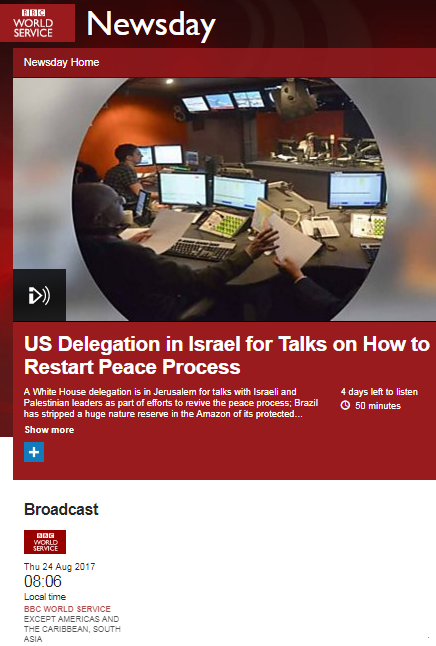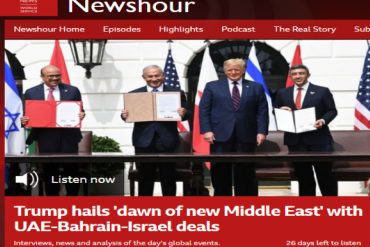As we have most recently seen in BBC coverage of the Israeli election and in an article by the BBC’s US State Department correspondent, the corporation’s framing a US administration peace plan which has not yet even been made public continues.
That framing has included the failure to clarify to audiences that the Palestinian Authority has already rejected the US initiative even before its publication, the failure to clarify that, significantly, the Palestinian Authority does not represent all the Palestinian factions and a total absence of information concerning Palestinian rejection of past peace proposals.
Additionally, BBC audiences have seen the two-state solution presented as “the formula for peace negotiations” but with that term only partially explained: the all-important phrase “two states for two peoples” is consistently absent from BBC presentation. Instead, audiences repeatedly see the two-state solution defined according to the Palestinian interpretation of it as meaning a Palestinian state on all of the territory occupied by Jordan and Egypt between 1948 and 1967.
Unsurprisingly, the BBC’s framing portrays the success of the as yet unpublished peace plan as dependent upon Israeli actions alone, with the Palestinian side reduced to a passive entity.
That pre-emptive framing continued in two items aired on the BBC Radio 4 ‘Today’ programme on April 16th. Listeners first heard a report (from 37:28 here) from the BBC Jerusalem bureau’s Yolande Knell introduced by co-presenter Justin Webb.
Webb: “Israel’s political parties meet the president today following the election of course. Yolande Knell is our correspondent in Jerusalem. What happens then, Yolande?”
Knell gave an explanation of the process of the president’s consultation with the heads of the parties which gained seats in the recent election in order to decide which party leader will be tasked with trying to form a new government before going on:
Knell: “…it’s extremely likely that it will be Benjamin Netanyahu that’s allowed to form the new government because he did win the greatest number of seats in the new parliament [not accurate – Ed.] and because he has support, we know, from the smaller Right-wing and pro-settler parties, he’ll be able to control the majority seats. And Israelis saying this is most likely to be the most Right-wing government in Israeli history. That was also the boast of the last government too. And of course this new government will be put in place – he’ll have 28 days to decide – Mr Netanyahu – if he can put…how he’ll put his government together…ahm…but this will come at a really important time.”
The item continued with pure speculation based partly on an article in a newspaper.
Webb: “Well an important time because Donald Trump says he has a peace proposal and a peace proposal that is acceptable to…ahm…err…the Netanyahu government potentially. In that case, if that were to be announced relatively soon, what would it be?”
Knell: “Well we’ve been looking for a lot of clues. Ahm…of course the big question is could the US abandon the two-state solution: this long-time international formula for peace that envisages the creation of an independent Palestinian state alongside Israel. It’s been written up in UN resolutions and it’s also been the cornerstone of US policy for over two decades now. But we had yesterday the Washington Post reporting that the US proposal probably wouldn’t include a fully sovereign Palestinian state and then the US Secretary of State Mike Pompeo giving a series of congressional hearings over the last two weeks and in questioning he didn’t give too much away for sure ahead of the publication of this long-awaited Trump administration peace plan but he did say that…or he seemed to imply that the idea of the two-state solution was bunched in with what he called ‘a failed old set of ideas not worth re-treading’ and he kept talking, as we’ve heard before, about recognising realities.
What’s also been pointed out really importantly is that the Trump administration and Mr Pompeo didn’t speak out against a campaign promise that was made very controversially by Mr Netanyahu in the last days of the election campaign where he promised to unilaterally annex parts of the West Bank where there are Israeli settlements…ah…put them under full Israeli control. And…err…of course settlements seen as illegal under international law but the Palestinians say that would leave them with no contiguous territory for a Palestinian state.”
As we see Knell’s speculative portrayal adheres to the BBC’s standard framing seen to date. The second item on the same topic in this programme will be discussed in part two of this post.
Related Articles:
BBC’s Plett Usher continues to promote her Israel narratives
BBC News amplifies PLO’s interpretation of the two-state solution
BBC News silent on Abbas’ rejection of Jewish state
BBC Radio 4’s peace process tango for one – part one
BBC Radio 4’s peace process tango for one – part two
Why is the BBC’s failure to properly report the Jewish state issue important?




